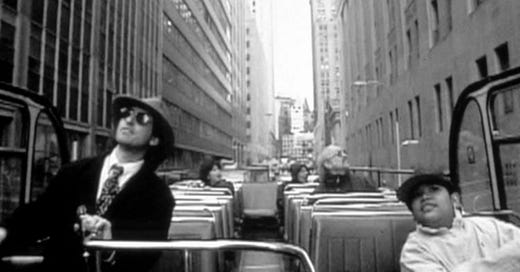Speed Levitch’s Manhattan Mystical Tour
A 1999 review of Bennett Miller's debut, restored for its twenty-fifth anniversary
Writers spend years finding their voice, one to present to the world in lieu of the cacophony that plays in our heads.
The spoken word, the realm of the talker, is another matter. “He just loves to hear himself talk” is a common catty comment I heard while growing up in the South (this usually out of the mouth of someone equally in love with language). Natterers and mutterers and tellers of tall tales are a part of our heritage: What is a more American character than the confabulator of hyperbole consumed by their own view of the world, the world refashioned in their own image?
Timothy "Speed" Levitch is a garrulous Manhattanite, a sometimes tour-bus guide with an abrasive voice, a wild head of hair, killer comic timing and an almost lunatic command of the minutiae of lives that have been led amid the grids of New York’s streets and avenues. “New York City is a living organism and so am I,” he tells documentary maker Bennett Miller’s camera. In gorgeously shot black-and-white, transferred from video, The Cruise, Miller's debut feature, offers a sidelong glance at the clotted island that his subject attempts to tackle head-on. Levitch lives for “the cruise”—his catch-all term for blissful forward motion through life, for experiences shared and recounted, and then described again and again to anyone who will listen. (Miller has since directed “Capote,” “Moneyball” and “Foxcatcher.”)
Levitch’s guided tours are packed with facts, factoids and colorful fantasy, twisting and turning through geography that is both physical and internal. He reinvents New York City with each word that tumbles out of his mouth: his journeys through the day are like an aboriginal songline, only with more jokes. Words sometimes evade their definitions in his gleeful concatenations of verbiage: sounding good is as important as being right. “Pay effervescent homage to the present tense,” he enthuses ecstatically in his fast, nasal, eminently New Yorker cadences.
Miller spent three-and-a-half years following his verbal dervish around the city, carrying a small “prosumer” video camera, taking in hours of Levitch’s schtick. “The Cruise” is one of the great D.I.Y. stories of contemporary indie filmmaking: Miller saw that Levitch had opinions and eccentricity to burn and videotaped him at small cost, even discarding the first hundred hours of raw material and starting over with a fresh approach. While it’s painful to think of burrowing through hundreds of hours of footage as Miller did to arrive at his seventy-six-minute feature, it was probably necessary in order to marshal this deceptively well-structured portrait of Levitch and his stormy relationship with his beloved city. Miller and his camera faded into the scenery, and Levitch soon lost his self-consciousness (but never his ample showboating instincts).
While eccentrics are always bursting out of the closets and tool-sheds and back bedrooms of this wide land, New York has more of them per square block than most places, and the familiar “Only in New York!” shake of the head indicates a peculiar form of pride in the way the city enshrines its eccentrics. Levitch tells one motley tour bus crowd, “H. G. Wells once wrote that to tell the history of New York City is to tell the story of the world,” hardly taking a breath, “Fasten your seat belts!”
As the compulsive talker regales his passengers, many of whom appear to be tourists who speak little English, Miller’s camera catches Levitch in profile. Behind him, the buildings and signage of the city move laterally, like scenery being moved in and out of a stage setting. The effect is simple, but like much of Miller’s craft, it’s thoughtful yet does not distract from his central purpose: capturing the tributaries of Levitch’s thrumming stream-of-consciousness. “Infinity will be in front of the bus when Fontanez [the driver] makes the existential left turn,” he tells his tourists. This is the manner of patter Miller finds, while leaving out the most basic biographical detail.
Levitch invents himself with each gust of wind, and Miller watches him go. “Speed” is alive while talking, riffing, improvising, vanquishing the internal monologue. At rest, his thoughts turn dark, and in one passage atop the Brooklyn Bridge, Miller captures Levitch, angry at past friends, unkind lovers, his mother. “The Cruise” allows for complexity: except through editing choices, we are not told how sympathetic or simply odd Miller finds his subject in his different moods.
Performing, Levitch makes up for his difficulties in making contact with others. Miller, who offers us only Levitch’s voice onscreen, cannily organizes his intimate material to delineate the difficulties one outgoing eccentric has with intimacy. Dizzy and dizzying, “The Cruise” reminds us that everyone is consumed by interior monologue; some of us let the rest of the world in on it once in a while.
Appeared in a slightly different form in Newcity in August 1999.



